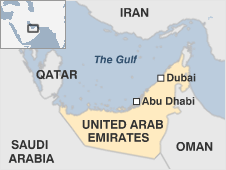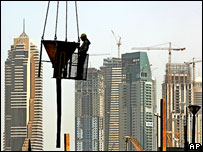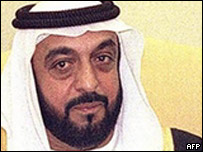 |
The United Arab Emirates (UAE) is a federation of seven states formed in 1971 by the then Trucial States after independence from Britain.
Although each state - Abu Dhabi, Dubai, Ajman, Fujairah, Ras al Khaimah, Sharjah and Umm al Qaiwain - maintains a large degree of independence, the UAE is governed by a Supreme Council of Rulers made up of the seven emirs, who appoint the prime minister and the cabinet.
Overview
Before oil was discovered in the 1950s the UAE's economy was dependent on fishing and a declining pearling industry. But since 1962, when Abu Dhabi became the first of the emirates to begin exporting oil, the country's society and economy have been transformed.
AT-A-GLANCE
 Politics: The UAE is one of the most liberal countries in the Gulf, with other cultures and beliefs generally tolerated. It held its first national elections - for an advisory body - in December 2006
Economy: The people of the UAE generally enjoy a high standard of living because of oil wealth; diversification has dampened the shocks of oil price fluctuations; the UAE is a regional trading and tourism hub
International: There has been tension between the UAE and Iran over disputed Gulf islands; the US treats the UAE as an ally in its "war on terror"
|
The late Sheikh Zayed, ruler of Abu Dhabi and president of the UAE at its inception, was quick to seize on the potential of the oil industry.
He oversaw the development of all the emirates and directed oil revenues into healthcare, education and the national infrastructure.
The oil industry has attracted a large influx of foreign workers who, together with expatriates, now make up more than three quarters of the population.
The country's growing business sector and its tourist industry have helped to fuel a construction boom, with billions of dollars being pumped into showpiece schemes. Chic hotels and skyscrapers are emblematic of cities such as Abu Dhabi and cosmopolitan Dubai.
The UAE is one of the most liberal countries in the Gulf, with other cultures and beliefs generally tolerated. Until December 2006 it was the only state in the region not to have elected bodies.
Facts
- Full name: United Arab Emirates
- Population: 4.6 million (UN, 2009)
- Capital: Abu Dhabi
- Largest city: Dubai
- Area: 77,700 sq km (30,000 sq miles)
- Major language: Arabic
- Major religion: Islam
- Life expectancy: 77 years (men), 79 years (women) (UN)
- Monetary unit: 1 Dirham = 100 fils
- Main exports: Oil, gas
- GNI per capita: US $23,770 (World Bank, 2006)
- Internet domain: .ae
- International dialling code: +971
Leaders
President, ruler of Abu Dhabi: Sheikh Khalifa bin Zayed
Sheikh Khalifa was named as president by the UAE Federal Council shortly after the death of his father, Sheikh Zayed Bin-Sultan Al Nahyan, in November 2004. The former president, who was 86, had been in poor health.

Sheikh Khalifa succeeded his father
|
Sheikh Khalifa, crown prince of Abu Dhabi since 1969, is said to be a pro-Western moderniser.
Often referred to as the father of the nation, Sheikh Zayed succeeded his brother as ruler of Abu Dhabi in 1966 and, because of his strong leadership and commitment to forming the federation, he was elected as the first president of the United Arab Emirates in 1971.
Reelected every five years since 1971, Sheikh Zayed instilled the values of religious tolerance and equality, especially for women, into his policies, which greatly enhanced the stability of the UAE.
- Vice president, prime minister, ruler of Dubai: Sheikh Mohammed bin Rashid al-Maktoum
- Ruler of Ajman: Sheikh Humaid bin Rashid al-Nuaimi
- Ruler of Fujairah: Sheikh Hamad bin Muhammad bin Hamad al-Sharqi
- Ruler of Ras al Khaimah: Sheikh Saqr bin Muhammad al-Qasimi
- Ruler of Sharjah: Sheikh Sultan bin Muhammad al-Qasimi
- Ruler of Umm al Qaiwain: Sheikh Rashid bin Ahmad al-Mualla
Media
Dubai aspires to be a regional and international centre for television and media, alongside Egypt and Lebanon. An Electronic Commerce and Media Zone Authority was created in 2000 to attract regional and international media outlets.
It allows 100% foreign ownership and offers tax breaks.
Major media organisations - including Reuters and Sony - have moved in. Established satellite broadcaster MBC relocated to Dubai Media City from London.
In 2008 Abu Dhabi announced plans to set up a media zone.
The constitution provides for freedom of speech but there is strong regulatory and political control of media content.
A 1988 law requires that publications be licensed and outlines acceptable subjects of reporting. Foreign publications are censored before distribution. Journalists tend to practise self-censorship when reporting on such matters as government policy and ruling families.
Internet use is extensive; by 2007 there were 1.7 million users (InternetWorldStats.com). According to Reporters Without Borders, the authorities filter websites for religious, political and sexual content.
The press
- Al-Bayan - private, Dubai-based Arabic daily
- Gulf News - Dubai-based, English-language
- Khaleej Times - private, Dubai-based daily, English-language
- Emirates Business 24/7 - English-language daily
- The National - Abu Dhabi-based English-language daily
Television
- Dubai Media Incorporated (DMI) - pan-Arab broadcaster, operates Dubai TV, Dubai One
- Abu Dhabi TV - pan-Arab broadcaster
- Ajman TV
- Sharjah TV
- MBC - Dubai-based pan-Arab broadcaster
- Al-Arabiya - news channel operated by MBC
Radio
- Abu Dhabi Radio
- Radio Asia - commercial, broadcasts in Hindi, Urdu and Malayalam
- Ras al Khaimah Radio
- Al-Arabiya FM - commercial, Arabic pop
- Dubai 92 - commercial, English-language pop
- Noor Dubai 93.9 - commercial, "Islamic-oriented" news, talk
- City 1016 - commercial, programmes in English and Urdu
News agency
-
Emirates News Agency (WAM) - official
AFRICA | ASIA-PACIFIC | AMERICAS | EUROPE | MIDDLEEAST | SOUTHASIA
Mauritania Mauritius Morocco Mozambique Namibia Niger Nigeria Republic-of-congo Rwanda Sao-tome-and-principe Senegal Seychelles Sierra-leone Somalia South-africa Sudan Swaziland Tanzania The-gambia Togo Tunisia Uganda zambia Zimbabwe Australia Brunei Burma Cambodia China East-timor Fiji Indonesia Japan Kazakhstan Kiribati Kyrgyzstan Laos Malaysia Marshall-islands Micronesia Mongolia Nauru New-zealand North-korea Palau Papua-new-guinea Samoa Singapore Solomon-islands South-korea Taiwan Tajikistan Thailand The-philippines Tonga Turkmenistan Tuvalu Uzbekistan Vanuatu Vietnam Antigua-and-barbuda Argentina Bahamas Barbados Belize Bolivia Brazil Canada Chile Colombia Costa-rica Cuba Dominica Dominican-republic Ecuador El-salvador Grenada Guatemala GuyanaHaiti Honduras Jamaica Mexico Nicaragua Panama Paraguay Peru St-kitts-and-nevis St-lucia St-vincent-and-the-grenadines Suriname Trinidad-and-tobago United-states-of-america Uruguay Venezuela Albania Andorra Armenia Austria Azerbaijan Belarus Belgium Bosnia-hercegovina Bulgaria Croatia Cyprus Czech-republic Denmark Estonia Finland France Georgia Germany Greece Hungary Iceland Ireland Italy Latvia Liechtenstein Lithuania Luxembourg Macedonia Malta Moldova Monaco Montenegro Norway Poland Portugal Russia San-marino Serbia Slovakia Slovenia Spain Sweden Switzerland The-netherlands Turkey Ukraine United-kingdom Vatican Algeria Egypt Iran Iraq Israel-and-palestinian-territories Jordan Kuwait Lebanon Libya Mauritania Oman Saudi-arabia Sudan Syria Tunisia United-arab-emirates Yemen Afghanistan Bangladesh Bhutan India Nepal Pakistan Sri-Lanka The-Maldives

